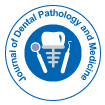Notre groupe organise plus de 3 000 séries de conférences Événements chaque année aux États-Unis, en Europe et en Europe. Asie avec le soutien de 1 000 autres Sociétés scientifiques et publie plus de 700 Open Access Revues qui contiennent plus de 50 000 personnalités éminentes, des scientifiques réputés en tant que membres du comité de rédaction.
Les revues en libre accès gagnent plus de lecteurs et de citations
700 revues et 15 000 000 de lecteurs Chaque revue attire plus de 25 000 lecteurs
Indexé dans
- Google Scholar
- ICMJE
Liens utiles
Revues en libre accès
Partager cette page
Abstrait
Knowledge, attitude, behavior, and perceived barriers towards oral health care among parents of children with disabilities in Qatar
Najat A Rabbo J S Alyafei
Qatar takes great pride in actively promoting equal opportunities for people with disabilities. The number of individuals with disabilities in Qatar makes up less than 0.50% of the total population. Government of Qatar mandates rights to education, medical and social care, rehabilitation, transportation and employment to persons with disabilities in unison with Qatar National Vision 2030. The launch of the ‘Doha Declaration’ at the closing ceremony of the Doha International Conference on Disability and Development (DICDD), December 7-8, 2019, underscores Qatar’s commitment to promoting policies that will ensure persons with disabilities are provided with opportunities for involvement, engagement and contribution in their communities. Doha declaration would be an international reference point for world governments to integrate the rights of persons with disabilities into their national development plans. In pursuance to improve the oral health of the children with disabilities an oral health program was conducted in 7 Government and 1 private school in Qatar.
It was integrated into ongoing Asnani School Oral Health Program. A team of Dental Hygienists and Dental assistants visited the schools and provided dental screening services with preventive fluoride varnish application to all the consenting students. Special oral health education sessions were conducted to deliver lectures to these students tailored to their type of disability. This program also marked the launch of oral health education messages in braille and sign language for the first time in Qatar. Acknowledging the role of families in the wellbeing of persons with disabilities, we conducted a research to assess the knowledge, attitude, behavior and perceived barriers of parents of the students with disabilities. Based on the results of this research, a comprehensive oral health education program was planned for the parents to empower them to acquire accurate knowledge and educated them about means to overcome the challenges they face. Caries prevalence was 64% among the students examined. Many of the parents were unaware of the presence of fluoride in the tooth paste and its role in preventing
caries. The most commonly perceived barrier was lack of awareness about the availability of Periodontists /special needs dentist to treat their children and the places where they could receive the dental care.
Revues par sujet
- Agriculture et Aquaculture
- Biochimie
- Chimie
- Food & Nutrition
- Génétique et biologie moléculaire
- Géologie et sciences de la Terre
- Immunologie et microbiologie
- Ingénierie
- La science des matériaux
- Le physique
- Science générale
- Sciences cliniques
- Sciences environnementales
- Sciences médicales
- Sciences pharmaceutiques
- Sciences sociales et politiques
- Sciences vétérinaires
- Soins infirmiers et soins de santé
Revues cliniques et médicales
- Allaitement
- Anesthésiologie
- Biologie moléculaire
- Cardiologie
- Chirurgie
- Dentisterie
- Dermatologie
- Diabète et endocrinologie
- Gastro-entérologie
- Immunologie
- La génétique
- Maladies infectieuses
- Médecine
- Microbiologie
- Neurologie
- Oncologie
- Ophtalmologie
- Pédiatrie
- Recherche clinique
- Soins de santé
- Toxicologie

 English
English  Spanish
Spanish  Chinese
Chinese  Russian
Russian  German
German  Japanese
Japanese  Portuguese
Portuguese  Hindi
Hindi